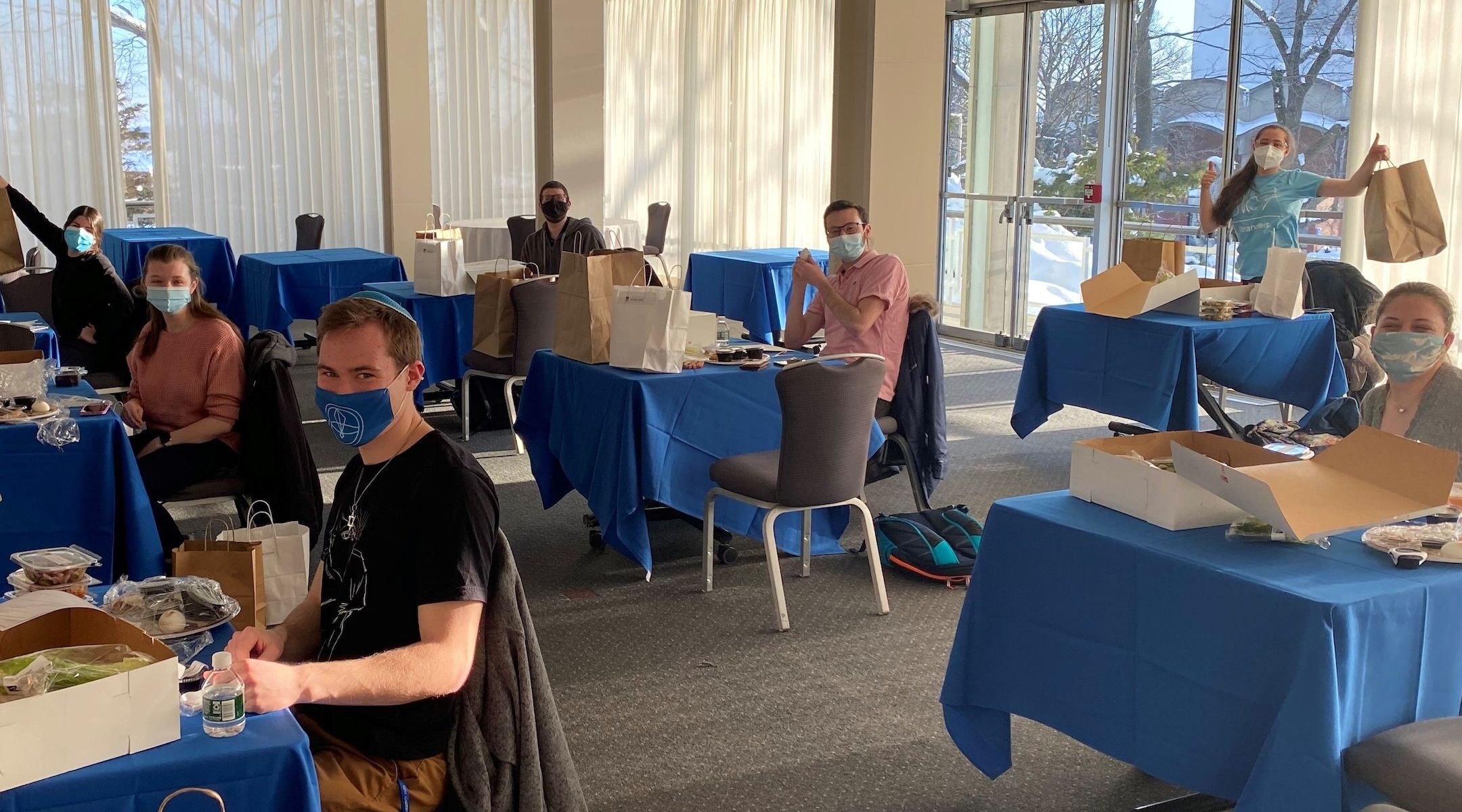BOSTON (JTA) – To prepare for Passover, Sam Greene is deep-cleaning his dorm room in keeping with the standards of his Orthodox Jewish family.
Lena Ben-Gideon is compiling readings about immigration to supplement her haggadah.
And Juliana Sherer is casting her friends in a dramatic performance of “Had Gadya,” the song that plays a prominent role in her family’s Seders.
In a typical year, the three Brandeis University students would be heading home to spend Passover with their families in Cleveland, North Carolina and Seattle.
But this spring, with the COVID-19 pandemic ongoing, Brandeis is keeping students on campus — and hosting Passover celebrations for the first time in its 73-year history.
Since it was founded in 1948 by the American Jewish community, Brandeis has scheduled its spring break to overlap with Passover. The tradition was pragmatic, according to Brandeis professor Jonathan Sarna, a historian of American Judaism: In addition to allowing students to celebrate with loved ones, closing campus during Passover allowed the school to steer clear of the daunting and costly undertaking of converting its kosher dining hall to meet the holiday’s standards.
But last year, Brandeis shuttered its campus in mid-March as the coronavirus pandemic descended on the United States. In the fall, and again in February, students returned to campus — with steep restrictions on their travel and a schedule designed to dissuade it. That meant no Passover break.
“I know how important this holiday is for families and for getting together,” said Brandeis president Ronald Liebowitz. But, he said, the college had a responsibility to minimize students’ travel off campus, “even for something as important as Passover.”
Gearing up to host Passover for the first time ever has required an all-out effort by Brandeis Hillel, which serves the university’s Jewish students. About a third of Brandeis’ 3,700 undergraduate students are Jewish, according to a college guide compiled by Hillel International.
Brandeis Hillel contracted with a seasoned local kosher caterer to prepare kosher-for-Passover meals, including individual Seders-to-go that 400 students registered to pick up.
Its rabbinic intern, Ilana Sandberg, a student at the Jewish Theological Seminary in New York City, is creating a commemorative Brandeis haggadah supplement that includes writing by students.
There’s even a four-day campus-wide Afikomen hunt, when students are invited to scour the hilly suburban campus for a hidden piece of matzah, inspired by the Seder ritual.
“We are trying to make all options available so students can have the most meaningful experience as possible,” said Rabbi Seth Winberg, Brandeis Hillel’s executive director and senior chaplain for the university’s Center for Spiritual Life.
About half of students celebrating Passover have opted for small in-person, student-led Seders. (Gatherings of more than 10 people are currently prohibited on campus.) Others will join their families on Zoom. Hillel staff will host a few small virtual Seders — including for non-Jewish students seeking to celebrate with their Jewish friends and learn more about the holiday, according to the school’s website.
“COVID presents an opportunity to empower students to learn how to lead a Seder and to be the producers of their Jewish experience,” said Winberg, who has made four how-to videos for students about preparing for Passover.
Sarna said he was worried about all of the logistics required to meet the needs of religiously observant students. In addition to eliminating leavened foods during the holiday, Jews who observe the full span of dietary laws associated with the holiday use different cooking vessels and dishes, ensure that ingredients are certified kosher for the holiday and, depending on their family’s traditions, may also not eat a host of associated foods known as kitniyot.
But Sarna said the school’s decision to contract with Andrew Wiener, who runs the respected Boston-area kosher caterer Catering by Andrew, alleviated those concerns.
“Once it was in Andrew’s hands, a lot of us who were worried breathed a sigh of relief,” said Sarna, who volunteered for a committee charged with making sure the university had a positive Passover experience.
Students who were invited to help craft the Seder menu at a tasting this spring gave high marks to Weiner’s brisket, grilled eggplant roulade, potato kugel, Moroccan salmon and chocolate mousse. Those dishes will appear on the Seder menu.
Beyond the Seders, Weiner is on deck to deliver 3,500 kosher-for-Passover meals during the holiday, which he’ll prepare offsite and distribute at a small kitchen on campus that has been made kosher for Passover. The school’s main kosher dining hall will be closed.
The cost of the Passover meals runs into the six figures, Winberg said, and is being shared between the college and Hillel.
Students say they are embracing the unusual holiday, even as they grieve a school year and a holiday disrupted by the pandemic.
“There’s a bit of mourning that loss. We have had to adjust to a lot out of our comfort zone during COVID and this is one of them,” said Sherer, a sophomore who is Hillel’s vice president. But she added, “It’s a special opportunity that we have to get to plan Seders with our friends.”
The historical nature of Brandeis’ first Passover is not lost on Ben-Gideon, the daughter of two Conservative rabbis from Greensboro, North Carolina, whose twin sister is also a first-year student.
“This is a once-in-a-lifetime opportunity,” she said. “What can we do to make it super exciting and awesome because it may be the only time this is going to happen?”
JTA has documented Jewish history in real-time for over a century. Keep our journalism strong by joining us in supporting independent, award-winning reporting.






